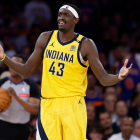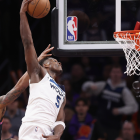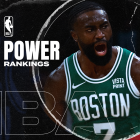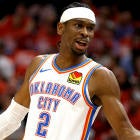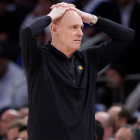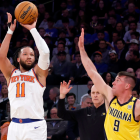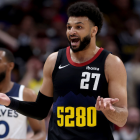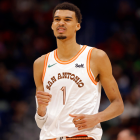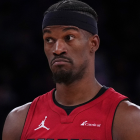In 2011, Derrick Rose was arguably the best basketball player in the world. He had gone from phenom, to explosive rookie, to leading an upstart Bulls team vs. the mighty Celtics in 2009, to winning MVP in 2011 for a No. 1 seed. Everything had gone Rose's way.
And then it all fell apart.
LeBron James and his Heat viciously won four straight after Rose's Bulls after Chicago won Game 1 of the 2011 Eastern Conference finals. The following season, Rose was plagued by minor injuries, the cost of high minutes shouldered under Tom Thibodeau. Then came the big injury, that moment vs. the Sixers when his leg buckled, suffering what doctors would later describe as "traumatic."
Rose never truly recovered. He came back, suffered a torn meniscus, came back, struggled with more injuries. Rose eventually was able to finish a season, but observers who saw him before and after the injuries knew he wasn't the same.
On media day in 2015, Rose told reporters he was looking for a big payday for his next contract. He was traded the following June. In January, it was reported that he was seeking a max contract. Now he has taken a one-year veteran minimum deal with the Cleveland Cavaliers. There have been more dramatic falls in the NBA. Ask Stephon Marbury. But difference between Rose today and six years ago is still stunning.
How will he adapt to the Cavaliers? Much of this depends on the Kyrie Irving situation. But for now, let's take a look at how Rose fits with the Cavaliers and LeBron James -- putting Irving aside.
Is he secondary playmaker?
James complained for much of last season about not having a secondary playmaker, and it appears he still does not have one.
Rose is an offensive weapon, and still a pretty good one with the ball. He was in the 74th percentile last season as a pick-and-roll scorer. Perhaps surprisingly, he's still very good at finishing despite diminished explosiveness.
He's also a radical departure from players the Cavaliers have targeted the past few years. Channing Frye, Deron Williams, etc. were spot-up weapons surrounding James to bolster shooting, and they have been one of the best 3-point shooting teams in league history the past few seasons.
Rose is the opposite of this. He shot 21.7 percent from 3-point range last season, and finished in the 20th percentile on spot-up plays, including drives (via Synergy Sports). If he doesn't have the ball in his hands, he struggles. He shot 31 percent on catch-and-shoot jumpers. But put the ball in his hands and he can knock down the jumper, making 45 percent of those shots -- good for the 78th percentile. This can be effective in Cleveland, where Rose would have better spot-up weapons to kick to than he had in New York or Chicago. But he has to be willing to make that pass, and that has been an issue.
Think of Rose as Irving without shooting range, though Irving had a substantially higher assist percentage and assist opportunities per game last season. But neither is a dynamic creator for others. While Rose can create individual offense, it's more difficult to determine if he can he help the offense function at its best. Last season, Cleveland's efficiency dropped by 13 points per 100 possessions without James on the floor. Can Rose soften that blow? While his numbers indicate that's unlikely, he is a scoring threat who can be effective for short stretches, which may be all Cleveland needs.
Similar defensive concerns
Rose's defense is a mixed bag on a team that is one big mixed bag with a hole in the bottom. On-ball he struggles with mobility. Off-ball he tends to fall asleep, pretty typical for guards with his usage. There are times when he's not as plugged in and winds up being a liability about as often as he's a strength -- much like Irving.
But for a team that is trying shrink the sizable gap between what they have and the Warriors, Rose doesn't help defensively. The Knicks' defense was five points worse per 100 possessions with Rose on the floor. There's a chance it will be roughly the same with the Cavaliers.
Most valuable dynamic
It figures Rose has been humbled by going from franchise player to afterthought -- a player with few options on the open market. Adjusting may be difficult, but could be freeing. The Cavaliers know what kind of player he is and will put him in a position to succeed, much the same way they've used players like J.R. Smith, Richard Jefferson -- and even Irving.
Rose was a low-cost investment for a team with minimal options. How he fits is unlikely to determine whether the Cavs win the title, but could decide the course of Rose's remaining NBA years.














